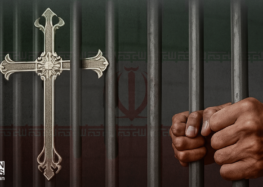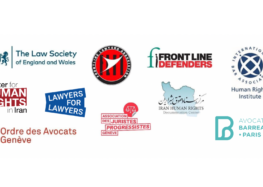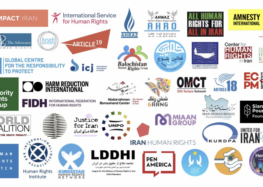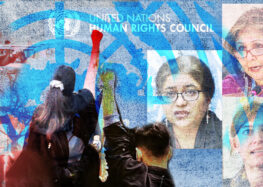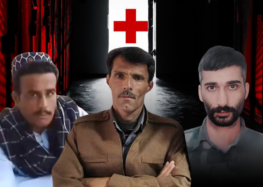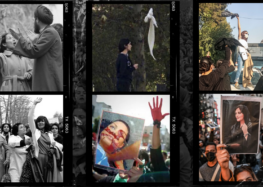UN Special Rapporteur: Iran’s Reputation Worsens Every Day Journalists Spend in Jail
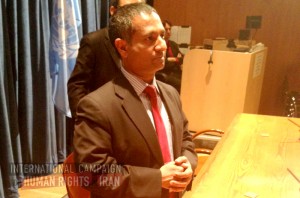
In his interview with the Campaign, Shaheed offered advice to Iran’s Human Rights Council head Javad Larijani, discussed the situation of imprisoned journalists, and expressed his broader message of hope for the Iranian people. Photo: The Campaign.
“For every day [journalists] spend in jail, Iran suffers a reputational problem somewhere in the world,” UN Special Rapporteur Ahmed Shaheed said in an exclusive interview with the International Campaign for Human Rights in Iran. “I signify … a heightened sense of caring by the international community about the plight of people in Iran.”
On October 24, Shaheed presented his third report on the situation of human rights in Iran, cataloguing “a wide range of human rights violations” and “the existence of widespread impunity.”
In his interview with the Campaign, Shaheed offered advice to Iran’s Human Rights Council head Javad Larijani, discussed the situation of imprisoned journalists, and expressed his broader message of hope for the Iranian people.
Excerpts from the interview follow, and the audio can be heard above.
International Campaign for Human Rights in Iran (ICHRI): You have now presented three reports about human rights in Iran, and you have raised concerns about hundreds of cases of human rights violations. What’s your message to the people who now are suffering inside prisons?
UN Special Rapporteur Ahmed Shaheed: The world cares. The world cares about the people of Iran. My office is a very strong statement that the world cares about the plight of victims of Iran, that they will not be forgotten, and that the world views, in its method of doing things—what it can—to protect the people of Iran. And I think my office is a voice for the voiceless: it documents things that have not been documented before, and it will ultimately make the government of Iran take notice of its actions and be willing to look at other ways of doing things. Because I am not alone. I am mostly working in concert with some of the other rapporteurs, thematic rapporteurs, because they share similar concerns. So what I signify is a heightened sense of caring by the international community about the plight of people in Iran. Of course, things are very difficult. They will remain difficult for a number of time, but the work we are doing is to try to ease those difficulties and find ways forward to get out, to arise from them.
ICHRI: You try to stay positive about Iranian officials’ communication, even when they use very bad language towards your mandate and you as a person, as a diplomat. How do you think this might reach a kind of negotiation, communication, dialogue?
AS: Iran’s response doesn’t surprise me at all because that is how a lot of times countries in that situation respond. It doesn’t foreclose from my point of view the door for negotiations. They can call me all sorts of things that they like. You know, we are adults. When you are an adult, you don’t take things personally, and you look at how things can move forward. And I am sure Mr. Larijani should look at trying to make his own office independent, in the sense that he gets recognized as a credible champion of human rights within the Asia Pacific Forum, where he attends. So I think it serves his stature, or such of his council, to do the job that it’s designed to do, which is to uphold human rights in Iran.
ICHRI: There are two imprisoned couples who are all journalists: Masoud Bastani and Mahsa Amrabadi, and also Jila Baniyaghoub and Bahman Ahmadi Amouee. They have been deprived of their basic rights; they cannot visit each other. What’s your message for them, who are inside prison, and how your reports could be a sign of hope for them?
AS: As a journalist, the constituency of their reach is quite wide. So I think globally, journalists take notice of what happens to their number elsewhere. So I think talking about the situation, giving publicity to their plight, will galvanize other reporters to talk about their case as well. I think most countries will find arresting journalists becomes the biggest headache for them. So I think if countries try to retain journalists in prison it causes them all sorts of problems because everywhere journalists will speak about the situation and Iran will suffer a very bad reputation for that.
ICHRI: How much they should keep their hope?
AS: I think they should remain very strong because they are part of a very strong community, it is a community of journalists, and they should know that for every day they spend in jail, Iran suffers a reputational problem somewhere in the world. So I think at the end of the day, Iran will find this is too much of a burden for them to carry on.
ICHRI: Any message for Javad Larijani, for the future?
AS: Very simple, yes. I think he has, he, in fact, bears the simplest avenue of resolving issues in Iran. And that would be, he has to become a head of an organization that is accepted by the Asia Pacific Forum on human rights.
ICHRI: Why there?
AS: By the Asia Pacific Forum on human rights. He must accredit himself to the UN body to become an independent institution. That’s the way forward for him and for the country as well.
ICHRI: Isn’t he independent now?
AS: No, he’s not, because the Paris—if he was, then his office would be recognized as being compliant with the Paris principles that the UN speaks of, and he would have been accepted as a Category A member in the Asia Pacific Forum of human rights.

